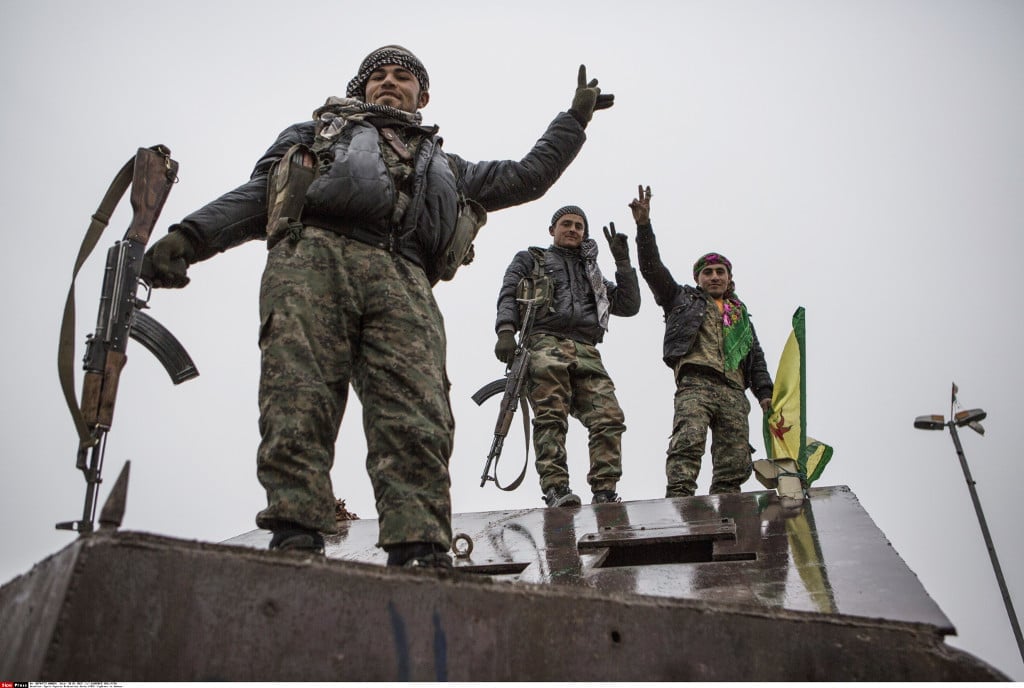
In March 2016 the Kurds in Syria declared a “federal democratic system” in the areas they control in northeastern and northwestern Syria. They consider the system a model for the whole of Syria, not just for the Kurdish regions, but the Syrian government and much of the opposition are afraid it will lead to Syria’s breakup and have spoken out against it.
Rojava (or West Kurdistan), as the Kurds call their Syrian lands consists of three kantons: Jazira and Kobani in the northeast and Afrin in the northwest. With the Kurdish takeover of Islamic State-held Tal Abyad in the summer of 2015, the Jazira and Kobani cantons are connected. The Kurds aspire to connect Afrin as well, but the lands between were heavily fought over by various groups up until the current ceasefire that began on 27 February.
There is little new about the declaration, voted for on 17 March, after a two-day conference. After all, the Kurds had begun to implement their ideology of “grassroots democracy,” with a system of local councils taking decision in cooperation with other local councils, when the troops of President al-Assad mostly left the Kurdish regions in 2012.
The timing of making official the reality on the ground, though, is not by chance. It has everything to do with the exclusion of the Democratic Union Party (PYD) from negotiations about Syria’s future in Geneva. Under pressure mainly from Turkey, the PYD was never invited to these talks, nor to talks in 2014 or the talks that soon collapsed at the end of January 2016 or the continuation of these talks currently going on in Geneva since 14 March. A proposed federal Syria seems negotiable for neither the Syrian government nor the opposition.
The declaration of “federal democracy” is also connected to the more important role Russia has been playing in the Syrian conflict since it began bombing the country on 30 September 2015 to strengthen al-Assad’s position. The Russian aerial campaign has subsided now, and Russia is withdrawing (part of) its troops, a move generally believed to be intended to push al-Assad to negotiate a peace.
The Kurdish PYD and its armed wing, the People’s Protection Units (YPG), have been diplomatically and militarily supported by both the Americans and the Russians. The ties between the Kurds and Russia have a long history, guided mostly by self-interest on both sides and were made official last month, when the PYD opened an office in Moscow. For the Kurds, this move is a means to an end: without powerful allies, demanding a place at the table will remain impossible.
Politics and diplomacy are clearly the present priorities for the Syrian Kurds. Until the ceasefire, which has largely held since 27 February, the military campaign of the YPG to connect their three kantons continued, although it doesn’t look as though they will achieve their goal anytime soon (see a map of the current situation in Syria). The fight against the Islamic Stae (IS) also continues during the ceasefire, and the YPG has to remain sharp at all times to minimize the IS threat, as was seen immediately after the start of the ceasefire: IS tried to recapture the YPG-held town of Tal Abyad and had to be pushed back with the help of US bombing.
Last October, the YPG joined forces with at least fifteen other armed factions—among them (part of) the Free Syrian Army and Christian, Arab and Turkmen militias—in the Syrian Democratic Forces (SDP). The SDP is dominated by the YPG, which is still the most important ally of the United States in the fight against IS on the ground in Syria. In less than a year, the group has recaptured from IS some 6,800 square miles of land in northern Syria.
Although Turkey is part of the international coalition against IS, the cooperation between the YPG and the United States is almost intolerable to the Turkish government in Ankara. After all, the YPG is an affiliate of the Kurdistan Workers Party (PKK), the armed Kurdish group that has been at war with the Turkish state for more than thirty years. The Turks consider the PKK and thus the YPG a threat to their national integrity, despite the fact that neither group aspires to establish an independent Kurdistan; they have an ideology that rejects altogether the concept of a nation state. Turkey has also shelled YPG positions, much to the displeasure of the United States, which has urged its NATO ally to stop the violence.
Turkey’s anger was revealed in a fierce speech by President Erdoğan when Brett McGurk, the US special envoy for Syria, visited the Kobani canton and met with PYD officials. Erdoğan angrily asked the United States to choose, asking: “How can we trust you? Am I your partner, or are the terrorists in Kobani?”
Turkey, as an important ally, so far has enough influence on the United States to keep the PYD banned from the international negotiating table about Syria’s future. But with the step the Kurds have taken now to give their kantons a more official status and with their closer ties to Russia, which has given it a more important role in Syria’s future, it remains to be seen just how long the Kurds can be excluded from the negotiations.


